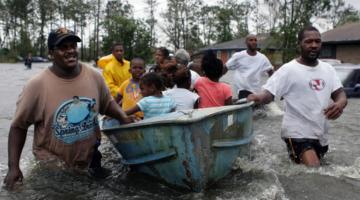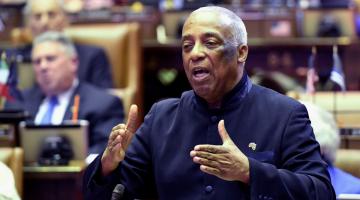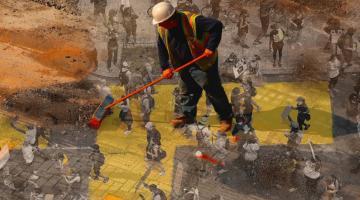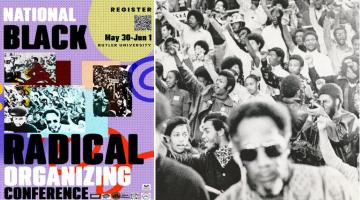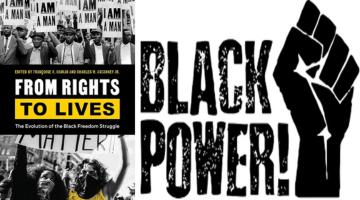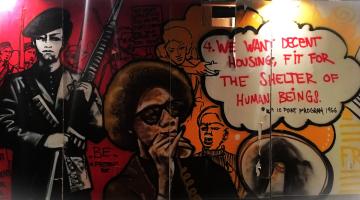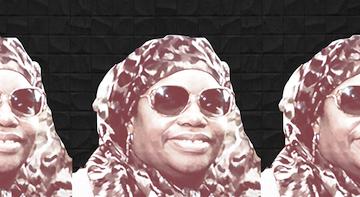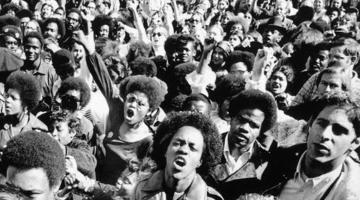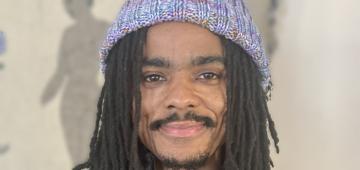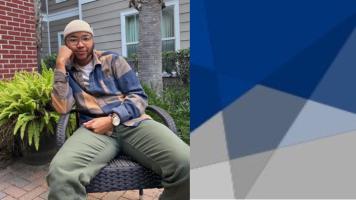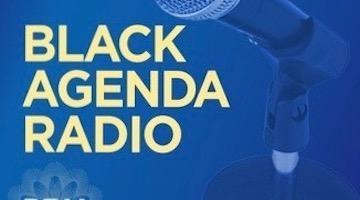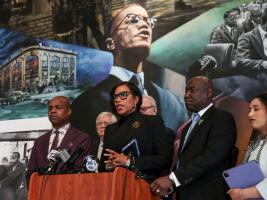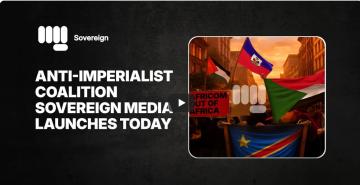Ahjamu Umi and Roberto Sirvent discuss revolutionary organizing.
Roberto Sirvent: Can you please share a little bit about your background, including how you became involved in community organizing?
Ahjamu Umi: My very first recollection of becoming aware of the need to do something to change this society happened when I was 11 years old. I was on a city bus in San Francisco traveling from school back to my neighborhood. The bus was extremely crowded. At one point, four teenage African (Black) young men rapidly boarded the crowded bus. They were each carrying firearms and I recognized all of them immediately as hell raisers from the neighborhood. They proceeded to force the riders to empty their wallets, purses, jewelry, etc., into garbage bags. They didn’t waste any time with me. They didn’t even look in my direction, or at least that’s what I thought. When they started to disembark the bus, one of them reached over towards me, slapped me across the face, and yelled towards me “don’t say s - - !” Then they were gone. Like the other traumatized passengers, I sat there frozen in fear. Probably more so than even the ones on the bus who had just been brutalized because I knew that these guys would have absolutely no hesitation in paying my family a visit if they thought I had done anything to sabotage their payday. Once the police arrived, as soon as they boarded the bus, a couple of the primarily European (white) passengers immediately started telling the police that I was either with the assailants or knew them. Some of the adults argued this point, understanding that I was a victim also, but none of that stopped the police from grabbing me from my seat and slamming me face first onto the filthy bus floor. Sometime later, I was released, without even a call to my parents. There were other similar incidents, but that one solidified for me that African people are not meant for this society in general and the police are not here to protect and serve us in particular. I also had some inclination, even at the underdeveloped level that an 11-year-old would have it, that these problems we would have to figure out a way to solve. As sad as it is, I understand even at that raw age, that this society is designed to create and maintain our problems, not solve them.
You’re actively involved with the All-African People's Revolutionary Party (A-APRP). For BAR readers looking to support or get involved with an organization, can you explain what makes AAPRP such an important part of your life?
The most simple and ill-refutable way I explain the importance of the A-APRP to people is by using the analogy of my being born and raised in San Francisco. That city, although a major source of life trauma for me growing up there, is seen and known by most people in the world as a prestigious city. As a result, whenever I introduce myself as growing up there, I’ve always gotten responses that reflect the respect people have for the city. The fact I grew up in the sewer portion of San Francisco is ill-relevant. By the same token, someone born in – for example – Holly Springs, Mississippi, would not receive the same level of response. Holly Springs is a wonderful African town in Northern Mississippi, but the point is people relegate the level of respect they extend to you based upon how they view the factors that make you up as a person in their mind. The A-APRP comes in because Africa is seen by most people as poor, ill-relevant, and unimportant to the forces that shape the world. If this is the reality, and no one can deny that it is, then we should easily understand that if Africa is disrespected in this way, there is no way her children can expect to be respected and/or respect themselves, despite whatever we do on an individual basis. The A-APRP understands this clearly and because of that, its call for Pan-Africanism as the objective that provides African people with worldwide respect and its strategy to achieve revolutionary Pan-Africanism presents the ideology (Nkrumahism/Tureism), objective – Pan-Africanism, and the plan to achieve it (the strategy laid out in Kwmae Nkrumah’s “Handbook of Revolutionary Warfare”). This blueprint is critical for a people who are often only provided with problems and never solutions. Since I’m a person who is always seeking solutions, the A-APRP is and has always been the perfect manifestation of what I am convinced our people need for our forward progress.
You wrote a wonderful piece on Hood Communist in June titled, “The Similar Logic of Trump and Obama Supporters.” In the article, you discuss the tremendous amount of crafty propaganda necessary to make U.S. citizens believe that Trump and Obama are radically different – and that they serve different interests. How does this dynamic work? And why is it so dangerous for Black liberation struggles today?
The strategy of the capitalist system is always to drive individualism down our throats as the only methodology available to us to live our lives. Consequently, this shortsightedness prevents us from seeing similar contradictions that exist among all oppressed people. All working people, etc. The capitalist system has one interest in mind: ensuring that all of us stay loyal to its interests. With capitalist individualism so rampant, whether its Trump or Obama, the supporters of each rely on subjectivity and perceived self-interest. This approach prevents any meaningful working unity and permits the capitalist system to continue to function without the fear of any threat being posed against it. This reality is critically dangerous for the African liberation movement because our reliance on individualistic idealism prevents us from seeing the necessity for developing a strong class analysis to join a gender and race analysis. Without all three, we are stunted in our ability to properly understand the forces at work and how they interact with us, how we interact with them, and what represents real concrete progress for the masses of African people instead of us being satisfied with subjective and symbolic representations of progress – representations that are based on individual advancements within the capitalist system and not anything even resembling a collective solution to our problems.
We had the honor of featuring your new book on the Black Agenda Report Book Forum earlier this year. What are some of the most exciting, surprising, or inspiring responses you’ve received from Black communities about the book?
Since I dropped A Guide for Organizing Defense against White Supremacist, Patriarchal, and Fascist Violence in February 2021, I have spent time using the concepts in the book to organize with groupings of young people in Detroit, Philadelphia, San Antonio, San Diego, Atlanta Florida, Sacramento, Central Oregon, Germany, Swaziland, and other places. This type of revolutionary organizing work is the reason I wrote the book so as long as my capacity can maintain it, I am overly excited to help people grasp the contents of the book on how to organize contributions towards systemic change wherever they are. I am always willing to work with people from anywhere on earth who want to figure out how to organize and strike blows against empire.
In an episode of the Green Flame podcast, you talk about a Sunday tradition you have with your daughter where you discuss important political topics. Can you share more about this tradition, along with any reflections you have about “revolutionary parenting”?
My daughter, my only child, is also active within the All-African People’s Revolutionary Party. In March of 2020, she and I were discussing how we could actively organize during the onset of the pandemic. We came up with the “Our Ancestor’s Voices” broadcast. Since that time we have broadcast 123 episodes at the time of this interview. We have an obvious focus on Pan-Africanist topics such as Zionism in Africa, how Africa’s resources are exploited, and many other topics, but the main emphasis is on things impacting the masses of people on earth. Last Sunday we did a broadcast on the current situation with Assata Shakur in Cuba since she hasn’t been seen or heard from in some time. We wanted people to understand the reasons for this so that we don’t fall for the imperialist anti-Cuban revolution propaganda about what’s happening with our Sister. That’s really the energy and impetus of the show. It airs every Sunday from 4 to 5pm PST through the aaprpca Youtube channel, aacpc Twitter account, and people can ask for the ZOOM link through the website www.abetterworld.me. All broadcasts are taped and housed on that aaprpca Youtube channel and can be seen on the video tab of the better world website.
One other thing I want to say about this program: I think it’s disgraceful that any random and ignorant manifestation of African fatherhood can be easily made viral by our people. Any expression of clown behavior, etc. Yet, with our program, we have an African father and daughter who truly love and respect one another and who share a genuine concern for the masses of African people and humanity and who are dedicated and involved in doing our best to do something about it. This program and others like it should be made viral by all our people who claim to support positive elements being generated within our community, not because we want recognition, but because we should do more to value all expressions of positive self-determination and revolution as a family affair of love and respect among our people. If we don’t do that, who will?
How can BAR readers support your work?
BAR is doing it by allowing us the opportunity to share our work here. We greatly appreciate this because African revolutionaries have few outlets. Any effort BAR can make to continue to remind readers about the “Our Ancestor’s Voices” program would be huge. Thank you, but even more than that, continue to encourage everyone to join some organization working for our people’s collective liberation. Our fundamental problem is most of us are not directly involved in our struggle, yet everyone who isn’t involved is a subject matter expert on what our people need. Clearly, this approach is not working. We must develop the level of respect for ourselves to become serious about understanding that no meaningful change for us comes until we organize and make it happen! And, by organization we mean mass involvement. Not a few people, but getting as many people engaged as we possibly can. We are convinced that this type of mass organization is truly the only way we can effectively mount a challenge to the forces of capitalism and imperialism that we believe are the source of every significant problem African people face everywhere on earth.
Ahjamu Umi is an organizer the All African People’s Revolutionary Party. He conducts regular work and trainings around self defense for oppressed communities. He is the author of “A Guide for Organizing Defense against White Supremacist, Patriarchal, and Fascist Violence.”
Roberto Sirvent is editor of the Black Agenda Report Book Forum.

